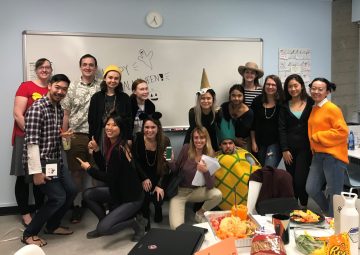
EQUITY, DIVERSITY, AND INCLUSION
Our lab strives to understand, and promote, the factors that support positive social relationships and social inclusion in youth (elementary school-age children, adolescents, and emerging adults). As part of this mission, we aspire to create a lab that values, includes, and learns from people with diverse backgrounds, beliefs, and experiences. We also aim for our work to contribute to a more just society.
This means that we seek to recruit, support, and retain lab members from diverse backgrounds and groups that have historically been underrepresented in psychology and in academia. It is important that we create an equitable environment for learning and working where all lab members feel supported and welcomed, including for the diverse perspectives they bring to the table. Another implication is that we are committed to seeking and including input from diverse research participants in terms of the data they provide for our research studies. Because all youth develop in a social and cultural context, it is a priority for us to understand how participants’ diversity in backgrounds shape their social experiences with peers, as well as with mental health service providers.
There are systemic factors, baked into our society over years of historical injustices, that have led to barriers to higher education, and to being beneficiaries of research knowledge, for certain groups of people. Although the efforts we make to recruit more diverse team members and study participants are important, they are addressing the problem at the individual level, and we think these types of efforts are the bare minimum that every lab should be doing. We also aim for our work to help dismantle the societal structures that perpetuate inequity. This is easier said than done, but we are trying to do so in a few ways. Many of us are members of Equity, Diversity, and Inclusion committees in our department and university, where we are working to change policies. In addition, through the design of our research questions, and the involvement of community stakeholders as advisory board members in our research design, we hope that our research will contribute to reducing health disparities. We view the process toward reaching our diversity, equity, and inclusion goals as dynamic and evolving, and we are continually engaging in new learning and reflecting on how we can do better as a team.

We value these goals for several reasons. Most simply, promoting inclusive and supportive social relationships is the primary aim of our research program, and the work from our lab (and others) have underscored the many ways youth benefit from these types of relationships. However, the need for a positive and inclusive social climate does not end in elementary school or even secondary school. Therefore, we strive to apply such a climate in our day-to-day lab culture as well.
Second, social relationships are complex and multi-faceted. An aim of our research program is to uncover some historically neglected and understudied factors that affect the peer relationships of youth (especially those with ADHD). Diversity in our research team and participants, and an environment where that diversity is valued and supported, will help us to solve the puzzle of social relationships by giving us novel ways of looking at the picture, and new intervention tools to address social problems for youth who are perceived as different.
Finally, we believe it is important to ensure that our lab and our research are representative of what society looks like today, reflect the larger community outside of academia, and results in research that benefits members of society more equitably (e.g., increasing fair access to treatment, and treatments that work, for communities that have been ignored or dismissed). It helps us to advance social justice and to do research that matters. Also, it is the only fair thing to do.
If you are considering joining us as a lab member, or volunteering as a research study participant, we greatly appreciate this and we value your contribution.